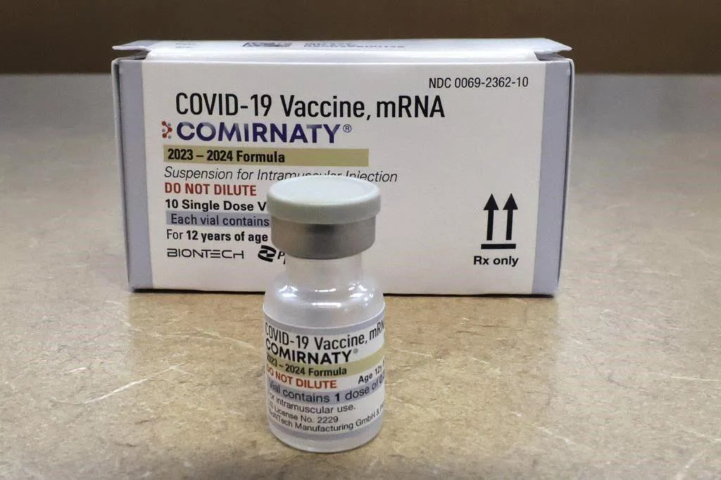
FILE - Comirnaty, a new Pfizer/BioNTech vaccination booster for COVID-19, is displayed at a pharmacy in Orlando, Fla., on Friday, Sept. 15, 2023. Older U.S. adults should roll up their sleeves for another COVID-19 shot, even if they received a booster in the fall, an influential government advisory panel said Wednesday, Feb. 28, 2024. (Joe Burbank/Orlando Sentinel via AP)
U.S. health officials recommended on Wednesday that older adults consider receiving another COVID-19 shot, even if they had a booster last fall.
The Centers for Disease Control and Prevention (CDC) advised that individuals aged 65 and above should receive an additional dose of the updated vaccine introduced in September, provided at least four months have elapsed since their last inoculation. This guidance aligns with recommendations proposed by an expert advisory panel earlier in the day.
Dr. Mandy Cohen, Director of the CDC, emphasized the importance of this recommendation, highlighting that most COVID-19-related deaths and hospitalizations last year occurred among individuals aged 65 and older. She underscored that an extra vaccine dose could offer added protection to those at the highest risk.
The decision by the advisory panel followed a thorough debate on whether older individuals "may" or "should" receive the additional shots, reflecting differing expert opinions on the necessity of another booster and concerns about vaccine fatigue among the public. While some doctors argue that most older adults already have sufficient protection from the fall shot, citing immunity from earlier vaccinations and exposure to the virus, preliminary studies show no significant decline in vaccine effectiveness over six months.
However, vaccine-induced immunity tends to diminish over time, especially in seniors, prompting the committee to recommend booster doses for older adults in 2022 and 2023. Despite progress in vaccination efforts, COVID-19 remains a significant threat, particularly to older individuals and those with underlying health conditions, with over 20,000 hospitalizations and 2,000 deaths attributed to the virus each week.
Members of the advisory panel advocating for a "should" recommendation aimed to encourage healthcare providers to offer the shots more emphatically. Dr. Jamie Loehr, a committee member, emphasized the importance of facilitating providers' ability to recommend the additional dose to patients.
In September, the government recommended a new COVID-19 shot targeting the XBB.1.5 variant. While the CDC endorsed these shots for individuals aged 6 months and older, those with weakened immune systems could receive a second dose as early as two months after the initial one. However, vaccine uptake has been modest, with only 13% of U.S. children and approximately 22% of adults vaccinated. Older adults have a higher vaccination rate, nearing 42%.
Dr. David Canaday, an infectious diseases expert, cautioned against over-recommending vaccines, acknowledging vaccine fatigue among the population. Yet, there remains a subset of Americans, particularly those at higher risk, who are seeking guidance on additional doses.
CDC data suggests that individuals who received the latest vaccine are 50% less likely to become ill after exposure to the virus compared to those who did not receive the fall shot, indicating the vaccine's effectiveness in reducing illness.















